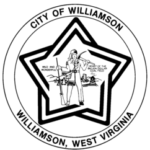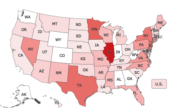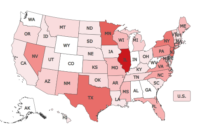 When politicians threaten to take public notice out of newspapers, it’s dog bites man. But when they make the same threat and explicitly frame it as punishment for negative coverage, it’s man bites dog.
When politicians threaten to take public notice out of newspapers, it’s dog bites man. But when they make the same threat and explicitly frame it as punishment for negative coverage, it’s man bites dog.
And what happened recently in Phillipsburg, N.J., was definitely man bites dog.
The Town Council in Phillipsburg introduced a proposal last month to move the city’s notices from The Express-Times of Lehigh Valley to other newspapers in nearby towns with lower circulations and different coverage areas.
Here’s how The Express-Times characterized the effort:
Small West Virginia Town Has a Secrecy Habit
 If a contest was held for the least transparent city government in the U.S., the small town of Williamson, West Virginia would have to be considered a strong contender.
If a contest was held for the least transparent city government in the U.S., the small town of Williamson, West Virginia would have to be considered a strong contender.
Williamson’s latest turn to the dark side came last week, when its city council held a “special meeting” to pass the first draft of its 2018-19 budget. According to Travis Crum of the Williamson Daily News, the council approved the budget and submitted it to the State Auditor’s Office “after receiving no public input and holding little discussion amongst themselves” about the fiscal plan.
Here’s more from Crum, a deft purveyor of understatement:
Legislative Front Still Calm
 The first quarter has ended and the legislative front remains relatively calm. Missouri is still the only state in immediate peril of passing a major public notice bill, but even there newspapers are beginning to see light at the end of the tunnel; the two measures that have given public notice advocates in the Show Me State cause for concern didn’t budge last month.
The first quarter has ended and the legislative front remains relatively calm. Missouri is still the only state in immediate peril of passing a major public notice bill, but even there newspapers are beginning to see light at the end of the tunnel; the two measures that have given public notice advocates in the Show Me State cause for concern didn’t budge last month.
Many bad public notice bills still litter the committees of the 30+ state legislatures that haven’t adjourned yet, but none appear to have any momentum. Nevertheless, several minor bills — some that add newspaper notice and a few that reduce it — have passed so far this year. Here’s the round up.
Missouri Only State in Present Public Notice Peril
 An election year? A surge in passion for government transparency? A growing admiration among state legislators for their local newspapers? Whatever the reason, the state of public notice in the U.S. remains unseasonably calm for this time of the year.
An election year? A surge in passion for government transparency? A growing admiration among state legislators for their local newspapers? Whatever the reason, the state of public notice in the U.S. remains unseasonably calm for this time of the year.
Lots of public notice-related legislation has been introduced — PNRC is tracking more than 200 bills — but so far most of it hasn’t gone anywhere. There have been pockets of activity over the last month, however. Here are the highlights.
Michigan Reporter Wins Public Notice Journalism Award
 Garret Ellison, a reporter for MLive and The Grand Rapids Press, today was named winner of PNRC’s 2018 Public Notice Journalism Award. Ellison won for a series of stories about an application submitted to the Michigan Department of Environmental Quality (MDEQ) by Nestle Waters North America to pump more groundwater from a local well. He is the first reporter in the history of the PNRC contest to be awarded for a story revealing the inadequacy of government website notice.
Garret Ellison, a reporter for MLive and The Grand Rapids Press, today was named winner of PNRC’s 2018 Public Notice Journalism Award. Ellison won for a series of stories about an application submitted to the Michigan Department of Environmental Quality (MDEQ) by Nestle Waters North America to pump more groundwater from a local well. He is the first reporter in the history of the PNRC contest to be awarded for a story revealing the inadequacy of government website notice.
Ellison will receive a $500 award and a trip to Washington, D.C., where he will be honored at a special March 15 dinner at the National Press Club.
State Legislatures Back; Public Notice Safe for Now
 The New Year again brought with it a flood of new legislation curtailing the role of newspapers as the official source of public notice. Fortunately, none of the new bills appear to be an immediate threat and several have already been killed in committee or face imminent demise.
The New Year again brought with it a flood of new legislation curtailing the role of newspapers as the official source of public notice. Fortunately, none of the new bills appear to be an immediate threat and several have already been killed in committee or face imminent demise.
Here’s an overview of some of the states that have been most active since legislatures returned to work.
PNRC Criticizes FCC Commissioners for Smug Dismissiveness
 In comments filed last month with the Federal Communication Commission, the Public Notice Resource Center criticized Commissioners who mocked opposition to a recent proposal that would eliminate FCC rules requiring broadcasters to publish a notice in a local newspaper when they file certain license applications with the Commission.
In comments filed last month with the Federal Communication Commission, the Public Notice Resource Center criticized Commissioners who mocked opposition to a recent proposal that would eliminate FCC rules requiring broadcasters to publish a notice in a local newspaper when they file certain license applications with the Commission.
“We were struck by the dismissive tone adopted in the statements of (some of the Commissioners) respecting the notion that local newspapers might still serve as the most effective means to deliver notice to the public,” said PNRC in its comments. “How did we reach a point where their consideration of the issue of public notice is so facile they ridicule a longstanding practice without bothering to provide any evidence that the alternative they’re promoting would be an improvement?”
The Year in Public Notice Legislation
 All things considered, it’s been a pretty good year for public notice.
All things considered, it’s been a pretty good year for public notice.
PNRC has been tracking about 150 separate bills introduced in 2017 or carried over from the previous year that relate to public notice. Most would have curtailed newspaper notice in some way, but 21 percent would have created additional notice requirements. To be sure, all of the latter addressed narrow circumstances like relocating the contents of a grave or tomb in Florida, or granting flood control district easements without public auction in Arizona. Nevertheless, it’s a clear sign that many public officials understand the continuing value of print as a distribution system for public notice in the digital age.
Court Rejects Claim Foreclosure Notice Violated Federal Law
 A U.S. District Court in Michigan ruled last month that a foreclosure notice published by the Detroit Legal News did not violate the Fair Credit Reporting Act. FCRA is a federal law designed to protect the privacy of consumer credit information held by credit reporting agencies.
A U.S. District Court in Michigan ruled last month that a foreclosure notice published by the Detroit Legal News did not violate the Fair Credit Reporting Act. FCRA is a federal law designed to protect the privacy of consumer credit information held by credit reporting agencies.
The case was filed earlier this year after plaintiffs Matthew and Stephanie Walker lost their home in a foreclosure proceeding. Their complaint alleged that Detroit Legal News violated their privacy rights under FCRA by publishing notice of an impending sheriff sale of the property. The notice included information about the sale and stated the Walker’s mortgage was in default and the amount they owed was $56,825.94.
This is How Public Notice is Supposed to Work
 Sydney Henderson is a 100-year-old widow living in a small condo at Hacienda Carmel, a senior living community in Monterey County, California. If it wasn’t for a public notice published in a newspaper, she probably would have lost her home and been booted out on the street by a bank. Her story is a textbook example of why public notice advertising still belongs in newspapers and not on obscure government websites.
Sydney Henderson is a 100-year-old widow living in a small condo at Hacienda Carmel, a senior living community in Monterey County, California. If it wasn’t for a public notice published in a newspaper, she probably would have lost her home and been booted out on the street by a bank. Her story is a textbook example of why public notice advertising still belongs in newspapers and not on obscure government websites.
Wells Fargo held the reverse mortgage Henderson secured on her condo in 1998. According to Mary Duan’s recent column in Monterey County Weekly, Henderson mistakenly believed she had enrolled in a government program that automatically rolled the property taxes into her regular mortgage payments. So she owed $24,000 in back taxes when the bank began foreclosure proceedings.
PNRC Files Comments Opposing Indiana Agency Proposal
 The Public Notice Resource Center filed comments early last month urging the Indiana Department of Environmental Management (IDEM) to reconsider its recent proposal to eliminate the newspaper notice requirement for certain permits issued under the Clean Air Act (CAA). IDEM’s proposal cited last year’s decision by the EPA to discontinue mandatory newspaper notice for such permits at the federal level. That new rule opened the door for EPA state affiliates like IDEM to follow suit.
The Public Notice Resource Center filed comments early last month urging the Indiana Department of Environmental Management (IDEM) to reconsider its recent proposal to eliminate the newspaper notice requirement for certain permits issued under the Clean Air Act (CAA). IDEM’s proposal cited last year’s decision by the EPA to discontinue mandatory newspaper notice for such permits at the federal level. That new rule opened the door for EPA state affiliates like IDEM to follow suit.
PNRC argued that Indiana newspapers and their websites are far more effective at providing official notice than IDEM’s website. It also cautioned that highly publicized controversies at state environmental agencies in Michigan and Arkansas demonstrate that few citizens ever see notices posted on government websites.
